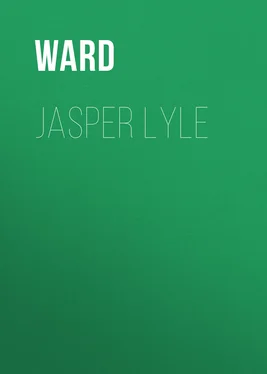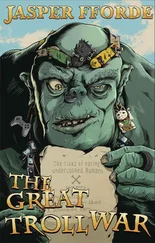Ward - Jasper Lyle
Здесь есть возможность читать онлайн «Ward - Jasper Lyle» — ознакомительный отрывок электронной книги совершенно бесплатно, а после прочтения отрывка купить полную версию. В некоторых случаях можно слушать аудио, скачать через торрент в формате fb2 и присутствует краткое содержание. Жанр: foreign_prose, foreign_antique, на английском языке. Описание произведения, (предисловие) а так же отзывы посетителей доступны на портале библиотеки ЛибКат.
- Название:Jasper Lyle
- Автор:
- Жанр:
- Год:неизвестен
- ISBN:нет данных
- Рейтинг книги:5 / 5. Голосов: 1
-
Избранное:Добавить в избранное
- Отзывы:
-
Ваша оценка:
- 100
- 1
- 2
- 3
- 4
- 5
Jasper Lyle: краткое содержание, описание и аннотация
Предлагаем к чтению аннотацию, описание, краткое содержание или предисловие (зависит от того, что написал сам автор книги «Jasper Lyle»). Если вы не нашли необходимую информацию о книге — напишите в комментариях, мы постараемся отыскать её.
Jasper Lyle — читать онлайн ознакомительный отрывок
Ниже представлен текст книги, разбитый по страницам. Система сохранения места последней прочитанной страницы, позволяет с удобством читать онлайн бесплатно книгу «Jasper Lyle», без необходимости каждый раз заново искать на чём Вы остановились. Поставьте закладку, и сможете в любой момент перейти на страницу, на которой закончили чтение.
Интервал:
Закладка:
He was a good man, and would have had no personal fear even if he had not been acquainted with the nature of the locality and its inhabitants; but he had no mind to have his horses torn limb from limb by wild beasts, and pitying them as their ears moved nervously backwards and forwards, their eyeballs starting from their sockets, he regretted that he had not delayed his expedition till the following morning.
There was no help for it now; the sinking horses looked piteously at him, and he longed to take their saddles from their galled backs, but he needed to look about him ere yet there was daylight: he regretted he had not brought his waggon-driver with him, but always thinking of others, he had overlooked his own necessities. He grieved for his horses, not for himself.
James Trail was the occupant of the mission-house, whither our English swallow had trilled her contented way. He was a childless widower, and, bent on conquering his sorrow for his lost Mary by earnest attention to his duties “in that path of life in which it had pleased God to call him,” he had made way for a married friend at his former station, and with a few native herds, a faithful Hottentot servant, and a distant relative, a trader in skins, ivory, horns, etc, had established a little location in the lovely but uncivilised part of the country through which he hoped to preach glad tidings of the Gospel; but the untameable race of bushmen, whom he longed to attach to himself, looked at him from their coverts like startled apes, and yelled, and shrieked, and chattered, and once shot at him with their poisoned arrows, happily without effect.
A trifling circumstance brought these mountain sprites to better terms. One of a hunting-party was severely bitten by a puff-adder while lingering behind his comrades, and Trail had discovered him, helpless and terrified, and “like to die,” by the side of a stream, to which he had crawled with the vain wish to ford it. The good Samaritan placed his neighbour on his own beast, after applying a remedy he always carried with him to the deadly wound; he took him home, and would have kept him, but the wild creature had been a rover all his life, and longed for liberty; as soon as he recovered, he fled to the hills to join his fellows. At times he would return, accompanied by a mate of his own tribe. One day he brought his children with him; another, two or three wild hunters, clothed in fitting skins, sat down in front of the mission-house, but would not draw near. They waited for their share of beads, their meal of mutton and bread and milk, and then scurried off to their nooks to send down others. Wretched creatures! these came in the dead of night as thieves, and Trail, wearied with their depredations, and grieved at his want of success among them, made such a compact as he could, by means of signs, assisted by his knowledge of the Dutch and Kafir languages. On condition that they would permit his flocks to feed in peace, he agreed to furnish them with game, Indian corn, and beads. The bushmen, knowing that if after this compact the pastor’s sheep were lessened in number, mutilated, or poisoned, their messengers would be sent empty-handed from his door, each kept a constant watch upon his neighbour, and this sort of truce had been kept between Trail and the pigmies up to the time when the former was making arrangements for a journey on business into the colony.
For a week previously to leaving his house to the trader’s care with two herds only, all, however, well provided with arms, the missionary had seen and heard nothing of his wild neighbours, and learning from his cousin, who had occasion to follow him, that they had not come down from the mountains since his departure, our good minister resolved, when on his homeward route, on penetrating the fastnesses which he had at first visited with pious intentions, but from which he had been driven, in such a fashion as would have made most men hesitate ere they set foot on such dangerous ground again: he felt it was his duty to seek these creatures.
He would have made a fine picture, seated on a grey rock which jutted out in an angle from the great mountain, which from base to summit, was seven thousand feet above the level of the ocean. The plain lay some hundred feet below, but the haze obscured it from the view. Trail felt very solitary between the sky and this shroud-like vapour; he looked at the poor brutes still panting beside him, and deliberated, as he took a survey from the rock on which he was perched.
There was not a sound now; even that restless caller, the whip-poor-will, was quiet. On each side of the traveller was a comparatively clear space, behind was a scarp of rock overhung with trees. Securing his horses, he relieved them of their saddles and bridles, laid his saddle-bags against the rock, and having seen that the animals had length of reim (thong of leather) to give them room to roll at full length upon the moist grass, he determined to climb higher up in search of the little colony, whose condition he had long deplored.
Trail was a man of about three-and-thirty; the features were homely, but the expression of the whole was highly benevolent; the frame was thin, and could not be called graceful, but it was neither ungainly nor vulgarly awkward; the eyes were large, and when lifted up, shone with a pleasant, not a sparkling, light; the hair was thinning on the temples, and the brow alone showed that by nature he was a man of a clear and fair complexion. The rest was bronzed by climate.
There he stood alone, alone in that magnificent solitude; the purpose for which he had come faded for a time from his memory, a gust of wind swept the mist away from the side of the hill to which he turned, and a part of the valley “lay smiling before him;” a stream of sunlight shot athwart it, and he saw the wild tenants of the wilderness, disporting and luxuriating as I have described; another gust opened the landscape wide, and as Trail’s eye swept the scene, his heart was lifted up in admiration. He turned the angle of the hill again, but the plain was hidden from his sight on that side, he could see nothing of his people and the bivouac below. He paused under a tall yellow-wood tree, and sat down again, his heart melting at the thought of what? his loneliness! His head rested on his hands, and he went back, back to his wedding-day at home in England, in the old church. There he stood, hand in hand with Mary (his old playmate) at the altar: by her side his sister cried bitterly, behind him her mother sobbed aloud, and the father’s silence was most eloquent, for the lips were firmly closed, and the eyes blinded with tears. Younger children gazed sorrowfully on—and then—there came the last parting. A ship in full sail, James and Mary Trail leaning over the side of the vessel while she is lying-to at Spithead; a boat below, from which many last gifts are handed up. A little sister weeping heavily, the mother with her face buried in her handkerchief, a young brother hastily wiping his eyes with the back of his hand, an elder sister trying to sooth the father, who “would not be comforted.”
They are all again before him: the boat pushes off; the old man stretches forth his hands, blessing the voyagers; the sister waves her handkerchief, the brother his hat, the mother tries to rise, but cannot, as the boat is swayed between the white-crested waves, which soon part the little vessel from the gallant ship; the yards are swung round, the boat has faded to a speck, the bows dash through the sparkling waters, churches, forts, and towers of the old town Mary Trail has never left before, glide away from her aching sight, and she lies down like a child to cry in her bridegroom’s sheltering arms.
And lo! there is a grave, the first grave hollowed in the mound on which a little chapel stands between two hills in Africa. There are others near it now, and a deep-toned bell sends out its hallowed call across the river, and up the kloof and on Sabbath days there is a gathering from many homesteads; but Trail has left this peopled spot for another. He visits it sometimes, and sits by Mary’s grave, but he can no longer bear it as a dwelling: nevertheless, he would have stayed there had there not been one at hand to take charge of the district.
Читать дальшеИнтервал:
Закладка:
Похожие книги на «Jasper Lyle»
Представляем Вашему вниманию похожие книги на «Jasper Lyle» списком для выбора. Мы отобрали схожую по названию и смыслу литературу в надежде предоставить читателям больше вариантов отыскать новые, интересные, ещё непрочитанные произведения.
Обсуждение, отзывы о книге «Jasper Lyle» и просто собственные мнения читателей. Оставьте ваши комментарии, напишите, что Вы думаете о произведении, его смысле или главных героях. Укажите что конкретно понравилось, а что нет, и почему Вы так считаете.












